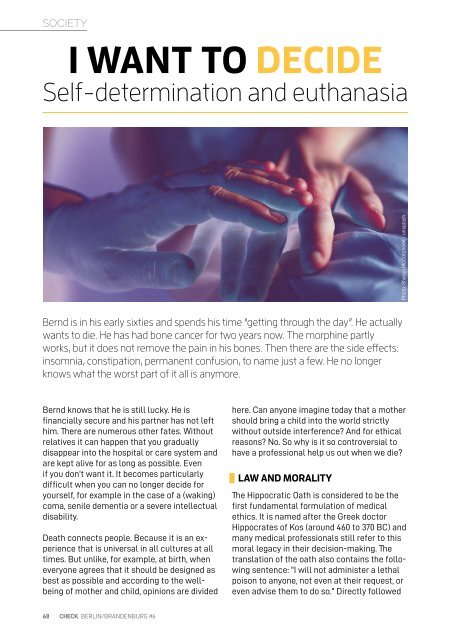CHECK Berlin/Brandenburg #6
Sie wollen auch ein ePaper? Erhöhen Sie die Reichweite Ihrer Titel.
YUMPU macht aus Druck-PDFs automatisch weboptimierte ePaper, die Google liebt.
Society<br />
I WANT TO DECIDE<br />
Self-determination and euthanasia<br />
Photo: Sharon McCutcheon / unsplash<br />
Bernd is in his early sixties and spends his time “getting through the day”. He actually<br />
wants to die. He has had bone cancer for two years now. The morphine partly<br />
works, but it does not remove the pain in his bones. Then there are the side effects:<br />
insomnia, constipation, permanent confusion, to name just a few. He no longer<br />
knows what the worst part of it all is anymore.<br />
Bernd knows that he is still lucky. He is<br />
financially secure and his partner has not left<br />
him. There are numerous other fates. Without<br />
relatives it can happen that you gradually<br />
disappear into the hospital or care system and<br />
are kept alive for as long as possible. Even<br />
if you don't want it. It becomes particularly<br />
difficult when you can no longer decide for<br />
yourself, for example in the case of a (waking)<br />
coma, senile dementia or a severe intellectual<br />
disability.<br />
Death connects people. Because it is an experience<br />
that is universal in all cultures at all<br />
times. But unlike, for example, at birth, when<br />
everyone agrees that it should be designed as<br />
best as possible and according to the wellbeing<br />
of mother and child, opinions are divided<br />
here. Can anyone imagine today that a mother<br />
should bring a child into the world strictly<br />
without outside interference? And for ethical<br />
reasons? No. So why is it so controversial to<br />
have a professional help us out when we die?<br />
LAW AND MORALITY<br />
The Hippocratic Oath is considered to be the<br />
first fundamental formulation of medical<br />
ethics. It is named after the Greek doctor<br />
Hippocrates of Kos (around 460 to 370 BC) and<br />
many medical professionals still refer to this<br />
moral legacy in their decision-making. The<br />
translation of the oath also contains the following<br />
sentence: "I will not administer a lethal<br />
poison to anyone, not even at their request, or<br />
even advise them to do so." Directly followed<br />
68 <strong>CHECK</strong> BERLIN/BRANDENBURG <strong>#6</strong>


















